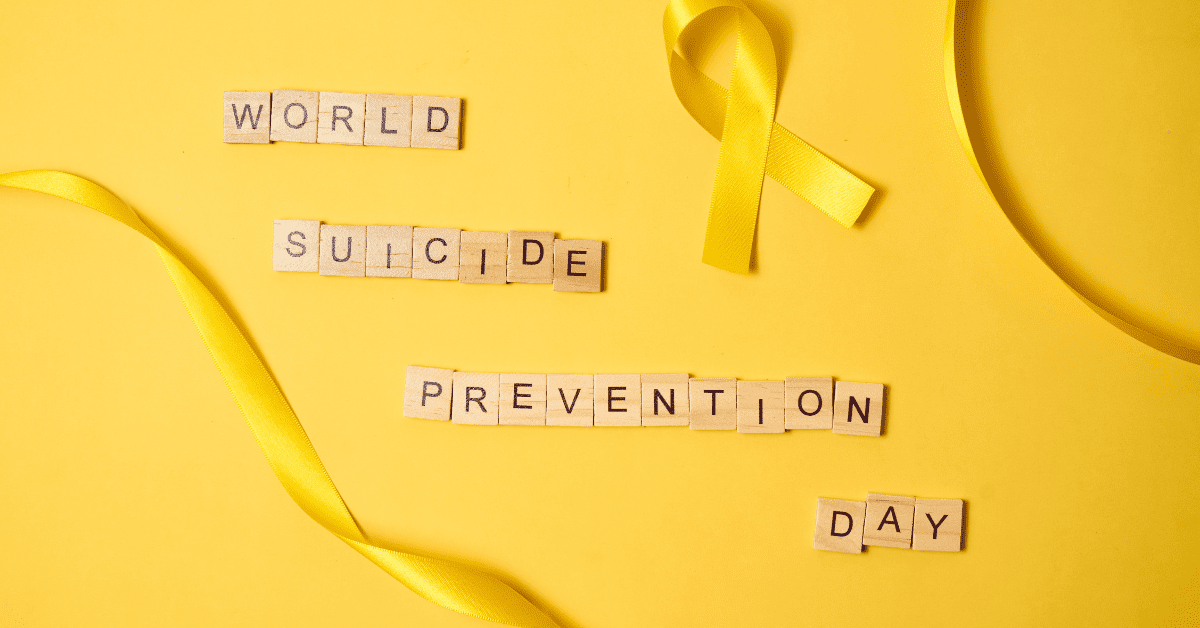What is World Suicide Prevention Day?

Trigger warning: suicide and mental health – This article discusses suicide and mental health. Please only read on if you feel comfortable to do so, and remember support is available if you need it.
This guest article was written by Kim Najran, Medigold Health’s Mental Health First Aid Trainer.

Although suicide rates in the UK have declined by 21% since 1981, the numbers have unfortunately risen again since 2007. Globally, it was reported that more than 720,000 people died by suicide in 2025. Closer to home, in 2023 there were 7,055 suicides in the UK — the highest figure since 1999.
These sobering statistics highlight why awareness matters so deeply. The aim of World Suicide Prevention Day is to encourage conversations that help people spot warning signs earlier, interrupt suicidal thoughts, and ultimately reduce the number of lives lost.
Established in 2003, the day brings together organisations, governments, communities and individuals around the world to share the message that suicide is preventable.
Why is World Suicide Prevention Day important?
In a survey carried out by Samaritans, where people with lived experience of suicide were interviewed, 60% said their suicidal thoughts were interrupted by someone they knew, and 16% said a stranger stepped in. This shows just how powerful it can be when people feel confident enough to spot the signs, ask the right questions and direct others towards support.
World Suicide Prevention Day plays a vital role in breaking down stigma and raising suicide awareness. It helps shift the subject of suicide from taboo to something we can — and should — talk about openly, so we can create change and save lives.
Top ways to support employees’ mental health
Whilst it isn’t always possible to spot all the signs, there are still things we can do in the workplace to support employee mental health and help prevent suicide.
Practise empathy in leadership
We hear a lot about the impact of leading by example – modelling the behaviours you want others to adopt. Practising empathy as a leader is no different and can have a huge influence on your people, encouraging them to speak more openly about their mental health.
Empathy is a choice. It means setting aside judgement and stepping closer to another person’s experience, rather than relying on your own. It’s about connecting with the feelings someone is expressing, rather than jumping to problem-solving or advice.
For example, if a colleague comes into work looking upset and tells you that their hamster died yesterday and they are struggling to cope, an empathic response would be to acknowledge their loss and difficulty. As leaders, we may see this as trivial, or perhaps we’ve never experienced it ourselves, but empathy means choosing to hear what the other person is feeling and believing it.


Watch for behaviour changes that could indicate someone is struggling
It can be difficult to know if someone is having suicidal thoughts, but it’s best practice to check in with people if you notice changes in their behaviour. While these changes don’t always indicate suicidal intent, some signs to look out for include:
- Expressing thoughts of suicide – any communication of this should always be taken seriously
- Dramatic changes in mood – such as a persistent low mood that suddenly lifts, or the opposite
- Saying goodbye or putting affairs in order – for example, formally thanking colleagues, handing back equipment or reorganising workloads
- Being withdrawn
- Increased alcohol or drug use.
Be involved in the conversation to help combat stigma
There is no better time to use your voice than to challenge the stigma that often prevents people from speaking openly about their mental health.
Suicide has long been surrounded by stigma. Until 1967, it was a crime in the UK to take your own life – which is why the phrase “commit suicide” became so common. Although it is no longer a criminal offence, the cultural shame attached to this history continues to affect how people talk about suicide today.
If you hear someone use the phrase “committed suicide,” try to encourage them to use alternative language, such as “died by suicide” or “took their own life.” This simple change can help to reduce stigma and promote more compassionate conversations.

Where to find support
If you are struggling with your mental health or are having thoughts of suicide, please remember that you are not alone and help is available. Your workplace may offer an Employee Assistance Programme (EAP) where you can access free help and/or counselling, or you can contact the support organisations below.
If you believe someone is at immediate risk of suicide – such as having a plan or intent to act – it’s important to take it seriously and act quickly. Stay with them if possible and seek urgent help from emergency services or a crisis support organisation. For clear guidance on what to do in an emergency, visit: If you think it’s an emergency | Samaritans.
Emergency help
- If you feel like harming or hurting yourself or others, call 999 or go to your nearest Accident and Emergency (A&E)
- If you need medical help but it’s not an emergency, call 111 for free NHS advice and to be directed to local crisis support services, available 24/7
Helplines for everyone
If you’re in crisis and need to talk, or if you’re worried about someone else, these organisations can help:
- Samaritans – 116 123 (open 24/7) | samaritans.org
- SANEline – 0300 304 7000 (open 4.30pm–10pm daily) | sane.org.uk
- Campaign Against Living Miserably (CALM) – 0800 58 58 58 (open 5pm–midnight daily) | thecalmzone.net
- National Suicide Prevention Helpline UK – 0800 689 5652 (open 6pm–midnight daily) | spuk.org.uk
How Medigold Health can help
At Medigold Health, we’re committed to helping organisations create safer, more supportive workplaces where conversations about mental health and suicide awareness are encouraged.
Through our specialist Mental Health First Aid (MHFA) and Suicide First Aid (SFA) training, we can equip your teams with the knowledge and confidence to recognise the signs that someone may be struggling and provide the right support.
To learn more about how we can help your business, contact our friendly team today.
The Latest from our Blog…
Check out our blog for all of the latest news, events and updates from Medigold Health.
-

Highlights from our 2026 Occupational Health Technician Conference!
At the end of January, we proudly hosted our annual Occupational Health Technician (OHT) Training Conference – two full days dedicated to professional development, shared learning and strengthening the exceptional clinical standards that define Medigold Health. Bringing together colleagues from across the country, the event really showcased the breadth of[...]
Read More -

Reasonable Adjustments Series: Autism
Welcome to the next blog in our Reasonable Adjustments Series! This series explores how small changes can make the workplace more inclusive and productive for everyone. But first – what are reasonable adjustments? Simply put, they’re practical changes, backed by the Equality Act 2010, that remove barriers and make work[...]
Read More -

Can employees refuse a drug and/or alcohol test?
It’s a question we hear a lot: can an employee say no to a drug or alcohol test at work? Whether testing is being considered after an incident, as part of a routine programme, or because there are concerns about someone’s behaviour, a workplace drug or alcohol test can feel uncomfortable for[...]
Read More





